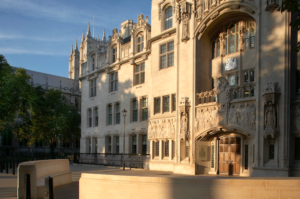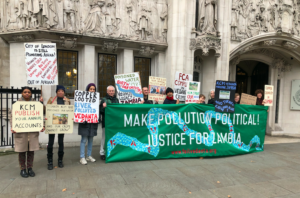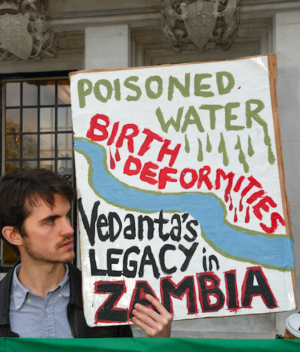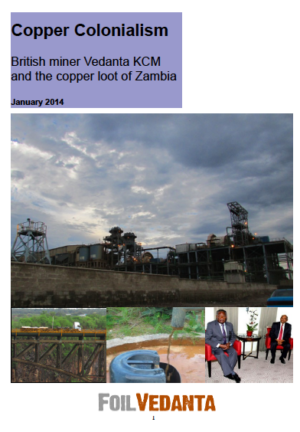
Report on the Supreme Court appeal hearing in the case Lungowe vs Vedanta, 15 – 16 January 2019.
This report follows our previous detailed write up of the Court of Appeal hearing, entitled ‘Police this gateway‘.
Court room 1 of the British Supreme Court was packed with journalists, solidarity activists, law students and other observers over the two day hearing, sitting in rows behind the legal benches. Each law firm was represented by two or three QCs as well as five or so advising lawyers sitting in the second row. In front of them five judges were seated behind a semi circle bench facing the rest of court. The ornate and grand stone building of the Supreme Court is located directly opposite the Houses of Parliament across Parliament Square. The court room itself is high ceilinged, with large stained glass windows, paintings of historic judges and extremely ornate carved stone and woodwork throughout the walls, ceilings and benches.

Outside the court entrance a vigil organised by Foil Vedanta continued throughout the two day hearing. Protesters held large green banner stating ‘Make Pollution Political: Justice for Zambia’ and a variety of placards with images of the pollution and some of the claimants in the affected villages.
Cherie Blair, wife of former British PM Tony Blair attended the first day of hearing, telling protesters outside she was there to support the case for UK jurisdiction.
The case concerns 1,826 farmers living near Chingola in the Zambian Copperbelt (the claimants), who issued proceedings against the first and second appellants – Konkola Copper Mines (KCM) and Vedanta – in the UK. They claimed to have suffered personal injury, damage to property and loss of income, amenity and enjoyment of land as a result of pollution and environmental damage caused by discharges of harmful effluent from the Nchanga mine since 2005.
On 19 August 2015 Justice Akenhead J permitted the Claimants to serve the claim form on KCM outside the jurisdiction. In September and October 2015 Vedanta and KCM respectively applied for declarations that the court lacked jurisdiction to try the claims or, alternatively, that it should not exercise such jurisdiction that it might have. Justice Coulson J dismissed those applications in the High Court in 2016 and the Court of Appeal upheld the his decision in 2017, after which Vedanta and KCM appealed to the Supreme Court.
The first day of the two day Supreme Court hearing was taken up with arguments by the Appellants (Vedanta and Konkola Copper Mines (KCM)). Charles Gibson QC of Henderson Chambers, who is instructed by Vedanta and KCM’s lawyers Herbert Smith Freehills, argued that the lower courts had erred in their judgment in the three year long case. He claimed that Vedanta is not a proper party to the case, and that England was not the proper forum for it to be heard in, going on to deal with the sensitive question of whether the claimants could get adequate access to justice in Zambia. The second day was dedicated to the response by Richard Hermer QC on behalf of the claimants.
Five judges sat in the major case, presided over by Lady Justice Hale, alongside Lady Justice Black, Lord Justice Wilson, Lord Justice Briggs and Lord Justice Hodge.

The court session started badly for Mr Gibson with the presiding judge Lady Justice Hale giving him a round telling off for the volume of evidence and information he had submitted to the court – three times what is considered the maximum, and extremely onerous for the court to deal with.
Charles Gibson is a corporate barrister who has appeared in many contentious cases including for BP in the Colombian Pipeline Litigation, VW in the Diesel Emissions Litigation, Unilever in claims arising out of election violence in Kenya, Shell in the Bomu-Bonny Pipeline Litigation and Trafigura in the Abidjan Personal Injury Litigation.
Real issue, proper party
He began his arguments by refuting the rulings of lower courts that Vedanta is a proper party to the case, claiming that they do not have a demonstrable duty of care to the claimants. His claim was that the landmark duty of care judgment Chandler vs Cape Plc [2012] cited by the claimant’s lawyers, Leigh Day – which was a judgment relating to the tort (damages) claim of a South African employee of a British asbestos company – did not apply to this case. He examined the arguments in Chandler vs Cape in detail, claiming, this was “not a Chandler case” as it did not fit the same list of criteria applied to prove duty of care in that case, namely:
1. That the business of the parent company and the subsidiary are to a relevant extent the same.
2. That the parent has or should have superior knowledge than the subsidiary.
3. That the parent knows or should know that the subsidiary operations were unsafe.
4. That the subsidiary was relying on the parent’s expertise to assist.
To this Lord Justice Wilson and Lady Justice Black intervened that they were by no means limited by the criteria applied in Chandler, noting that the courts may make ‘incremental development of the law’.
He then examined the findings in the recent cases of Okpabi and others v Royal Dutch Shell and another, a damages claim by victims of Shell’s oil pollution in the Niger delta, and AAA and others v Unilever Plc and another, a claim by Kenyan tea workers against the company for failing to protect them from beatings, rape and killings on the plantation during the 2008 Kenyan elections. The two cases, which are also being led by law firm Leigh Day, failed to prove that the parent companies owed a duty of care in British courts in 2018, making the Vedanta case an extremely important test for parent company responsibility, which claimants affected by other British multinationals will be watching closely.

He claimed that Vedanta cannot be held to have a duty of care to the claimants who are farmers polluted by its mines because Vedanta did not exercise substantive control over its Zambian subsidiary KCM, neither do they have adequate ‘proximity’ to the claimants. He argued that a duty of care could only apply if Vedanta was able to take over and manage the mines, which, he claimed, they could not lawfully do as KCM is the only licensed operator. He claimed the appellant’s evidence that Vedanta provided loan agreements, funding and management services to KCM was not sufficient to prove proximity between the parties. He stated that in the ‘management agreement’ under which Vedanta would provide up to $1 million worth of management services annually, Vedanta was treated as an independent contractor. This $1 million annual management charge was one of the items questioned by the Government of Zambia’s forensic audit team in 2014 as a possible tax evasion strategy, artificially reducing KCM’s annual income by paying Vedanta for ‘services’.
He went on to make the outrageous claim that Vedanta’s corporate governance framework could not be used to claim proximity between the parent and subsidiary in Zambia, as “the corporate structure itself tends to militate against the requisite proximity”. In other words the corporate structure is legally designed to separate subsidiaries from the parent as part of the ‘corporate veil’, and this should not be legally challenged. He asserted that “it would be a ridiculous burden to assume that Vedanta owes a duty to intervene in all its subsidiaries worldwide.”.
He repeatedly stated that Vedanta is a holding company with only 9 directors and 11 admin staff who could not have control over subsidiaries. Furthermore a suite of company policies including their Sustainability Framework, which set out mandatory environmental policies across the group companies (and which in the Court of Appeal he argued were only brought in due to LSE guidelines), do not lead to a duty of care by Vedanta, as they make it clear that subsidiaries should create their own policies and implement them. Furthermore he argued that since Vedanta’s Sustainability Framework was only brought in in 2011, it could not be held as evidence of proximity of claims which relate to damages from 2005 to the present day. The period from 2005 until 2011 should be treated differently as a result, he claimed.
It was noted that there have only been two previous cases in this jurisdiction which found a duty of care by a parent company – Chandler vs Cape and Thompson vs Renwick Group Plc. Both these cases concerned employees of the subsidiary and not claimants affected by a subsidiaries actions as in the Vedanta case. Since the Unilever and Shell cases have now been struck out, the Lungowe vs Vedanta case is extremely significant.
Gibson outlined Vedanta’s desire that the court refer aspects of the case to the European Court of Justice (ECJ), suggesting that the application to file a case in the UK – brought by a non EU claimant against an English (EU) domiciled parent company and its non EU domiciled subsidiary, is an abuse of EU law. A referral to the ECJ could delay the start of the damages trial even further, after claimants have already waited three years since filing just to deal with Vedanta’s interlocutory application against the UK jurisdiction.
Gibson finished this section by warning the judges in muttered tones that the High Court’s judgment in this jurisdiction case represented a big shift in the law on parent company responsibility, and the judges should be cautious to avoid opening the floodgates to further claimants with damages against Vedanta as well as other British multinationals. At this, Lord Wilson intervened, pointing out that intervening submissions in the case by NGOs CORE and ICJ suggest that there is a similar trend towards parent company responsibility in international law. A plea to judges to ‘police this gateway’ to UK justice was a strong feature of Gibson’s Court of Appeal argument.
Richard Hermer’s response on the second day of the hearing began by pointing out that this a case of some of the world’s poorest people against a large and powerful corporation. He then addressed the question of whether EU law is being abused by the UK jurisdiction request. He claimed the case could not be referred to the ECJ as it is only concerned with which EU country a claim should be heard in if there is a dispute. Therefore the claimants could only be abusing British law by pursuing a meritless claim, and could not be accused of abusing EU law.
Moving on to whether the claim has any merit and is therefore a ‘real issue’, he suggested that asking the claimants to prove that they have a ‘real issue’ at this stage would be unfair and onerous as the current interlocutory application case would only permit very limited disclosure of private documents in possession of Vedanta, which they would need in order to prove they had a case with real merit. Therefore suggesting that they should prove that they have a real issue at this stage would bias the case towards Vedanta, who could with-hold important documents which might later be relied on in a trial.
On the issue of duty of care, Hermer claimed there was no attempt to ‘pierce the corporate veil’ by suing Vedanta as well as KCM, but instead simply to hold a relevant legal entity (a parent company) responsible for its actions. It was wrong to suggest that the parent company should be protected from its duty of care. He claimed this was not a remarkable or unusual case as Gibson had suggested, but instead was a simple negligence claim. He asked why a court should shield a company from the harmful effect of its actions, and cited the Zambian High Court ruling by Justice Musonda who found that KCM had “had no regard for human, animal and plant life” and suggested that “in their countries of origin such recklessness would have been visited by severe criminal and civil sanctions”.
He claimed that the existence of mandatory policies issued by Vedanta to their subsidiaries is enough to show that they should have a duty of care. He then spent some time quoting at length from Vedanta’s Embedding Sustainability report, including quotes stating clearly that “we exercise control” over subsidiaries, and that the Sustainability Committee works “at the operational level” to monitor and improve environmental performance.
He further cited a Management Agreement and Shareholder Agreement between Vedanta and KCM as well as evidence from a KCM middle manager who said he “couldn’t tell the difference” between KCM and Vedanta documents. The Management Agreement referred to Vedanta’s pledge to share its ‘know how’ with KCM, including in mining and geological matters as well as logistic support and much more, flying in the face of Vedanta Company Secretary Deepak Kumar’s submission that Vedanta Plc is ‘not a mining company’ and therefore could not exercise any control over KCM nor be responsible for its actions. He further cast doubt on the submission of KCM manager Mr Ndulo that Vedanta does not exercise control over KCM, noting that he had been found to mislead an English court during a previous case regarding arbitration between KCM and a contractor – U&M Mining. In the 2014 ruling Justice Teare J described KCM as “…an entity which has employees willing to give untrue evidence, to cause unnecessary harm, to be obstructive of the arbitration process and to take untenable points with a view to delaying enforcement…a party willing to do all it can to prevent the other party from enforcing its legal rights.”
Hermer suggested, and Lord Briggs agreed, that the documents available reflect the ‘actuality’ of Vedanta’s control over KCM, which would be revealed further at trial with disclosure of internal Vedanta and KCM documents.
His final example cited the case of Lisheen mine in Ireland, another Vedanta subsidiary, where, after a fatality at the mine in 2013, Vedanta took control of the operations, overruling managers’ decision to close the mine and jeopardising their relationship with local farmers and others with whom they had agreements. This case, he claimed, proves that Vedanta does exercise control over subsidiaries and can step in to take control when required.
The British Supreme Court
Forum non conveniens
Gibson then dealt with the issue of whether the case should be heard in the UK, claiming it was a ‘forum non conveniens’, as Zambia would be the more natural and efficient forum. He suggested that the only ground for the argument that England was the proper forum in the previous hearings was the argued risk of parallel proceedings (arising from the ECJ ruling in Owusu vs Jackson [2005]), which would arise if the claimants intended to file against Vedanta in the UK and KCM in Zambia, in the event that they were unable to file against KCM in the UK. Gibson disputed the claimant’s assertion that they would file a claim against Vedanta in the UK even if KCM could not be included, claiming that this could be a ‘device’ by which to drag KCM and Vedanta together into the English jurisdiction.

The question arises out of historical circumstances. The preceding Zambian case of 2,001 claimants for damages to health by a major pollution incident in 2006 (Nyasulu and 2000 others vs KCM), was only against KCM, and not Vedanta. At the beginning of the current case Vedanta had refused to submit to jurisdiction in Zambia, as it is a British company, and therefore, Leigh Day claimed, they were forced to take their case against Vedanta, and also KCM, in England instead. Subsequently, Vedanta have ‘submitted to the jurisdiction’ and would agree to be tried in Zambia, while they argue that they are not a proper party to the case in England. This raises the important question, dealt with by the claimants’ QC Richard Hermer on the second day of the hearing, of why Vedanta are so keen to be tried in Zambia rather than the UK. Hermer cited the Zambian High Court judgment by Justice Musonda in Nyasulu and 2000 others vs KCM [2011] which stated that KCM had been “shielded from criminal prosecution by political connections and financial influence” assuggesting the possible advantages to the company of a Zambian trial.
Gibson went on to argue that if it were held in the UK the case would not meet the criteria for group actions; that they should be dealt with efficiently, cost effectively and justly – since the claimants are in Zambia and matters of ‘quantum’ and ‘causation’ would have to be dealt with in each individual case. At this Justice Lady Hale intervened, pointing out that it would be normal in a group action case only to look at details for a handful of main claimants and infer damage from these. She also pointed out that the English court could go to Zambia to take evidence, rather than bringing claimants to the UK.
Gibson then attempted to whip up a sense of fear and overwhelm, claiming there could be “an infinite number” of further claimants in the Vedanta case if the UK jurisdiction is granted, pointing out that that the law firm (Hausfeld) already have 1000 further claimants waiting on the results of this case. The precedent potentially set by this case could then further open the gates to other victims of harm by British multinationals. This is another attempt by Vedanta’s lawyer to scaremonger the judges with an unreasonable threat that UK courts will be flooded with expensive cases by foreign claimants, failing to recognise the enormous barriers to claimants obtaining lawyers and funding for such cases, and further ignoring the basic principles of recourse to justice for victims of harm.
Richard Hermer responded to Gibson’s suggestion that the claimant’s motives to sue in the UK were abusive of the legal system, claiming that the issue of motive has no relevance to arguments about whether claimants have a ‘real issue’.
Access to justice
He then addressed the issue of access to justice in Zambia, a very sensitive matter as the Zambian Attorney General had previously accused the court of ‘neo-colonialism’ by exporting justice from Zambia to the UK, though he later retracted this statement. Both Justice Coulson in the High Court judgment, and Lord Justice Simon at the Court of Appeal, had noted the sensitivity of this issue. Justice Simon’s ruling stated “There must come a time when access to justice in this type of case will not be achieved by exporting cases, but by the availability of local lawyers, experts, and sufficient funding to enable the cases to be tried locally”. Yet he still concluded that the facts in this case suggested that the claimants may not currently be likely to achieve substantive justice in Zambia.
Gibson relied on new intervening submissions from the Zambian Attorney General, as well as evidence from former Chief Justice Ernest Sakala, which attempt to evidence that the justice system is improving, and the claimants would have access to funding, lawyers and court hearings in Zambia, therefore this was not a barrier to the case being heard there.
Further, he disputed the claimants lawyers’ reliance on the Nyasulu case to prove lack of justice. It had successfully delivered a guilty verdict against KCM at the High Court and Supreme Court of Zambia, but reduced $2 million of damages awarded by Justice Musonda at the lower court, to effectively nothing in the Supreme Court ruling, as only the twelve claimants with medical records from the time of pollution were entitled to claim for damages, subject to hearings in the High Court. A lack of funding and legal representation has up til now prevented any of the twelve doing so.
Gibson claimed that the ruling was not a ‘disastrous’ lack of justice, as Leigh Day had suggested, but instead was simply a procedural error on the part of the lower court judge to award damages without individual assessment of claims, which was corrected at Supreme Court level.
Foil Vedanta have documented the long years of proceedings in the Nyasulu case in various articles on our website, including the three years the claimants waited for a Supreme Court hearing after KCM appealed the High Court judgment, only getting a hearing date following our protests in London in 2014, and the claimants personally approaching the Zambian President, the late Michael Sata, after which a date was finally scheduled. We also documented evidence of corruption in the case, including KCM doctors’ refusal to issue medical notes to polluted people after they came to hospitals with poisoning, the apparent enrichment of their lawyer Kelvin Bwalya following the High Court case, and the conflict of interest in former Vedanta lawyer Albert Wood sitting as a judge in the Supreme Court hearing. In total the claimants waited nine years from the filing of their claim to receiving the Supreme Court judgment.
Gibson went on to examine several historic Zambian group actions, in which the NGO Citizens for a Better Environment had helped to fund initial costs, as evidence that there is no lack of funding or availability of lawyers. He noted that Zambia has various laws on environmental protection, can give claimants cost protection, and allow NGOs standing to bring cases in their own right.
Richard Hermer’s reply noted the difficulties with the Nyasulu case, as above, and went on to claim that though it may be the case that a smaller scale environmental group claim could be viable in Zambia, a case of this scale, cost and complexity would be too much for one small law firm (as most in Zambia are) to deal with.
What next?
The five judges will deliberate on the evidence and arguments and a verdict is expected sometime in April. If they uphold the lower court’s rulings that the trial can proceed in the UK, the claimant’s trial will finally be able to begin, most likely sometime in 2020. However, it is also very likely that Vedanta will be keen to prevent the case going any further by offering an out of court settlement via negotiation with Leigh Day, and potentially also Hausfeld, another law firm who have 1000 claimants waiting on the jurisdiction ruling.
What is most important is that the final settlement is not merely financial compensation, but includes a requirement for Vedanta and KCM to clean up and remediate the heavily polluted areas along the Mushishima Stream and River Kafue, and even resettle communities who should no longer be forced to live on poisoned land or drink toxic water. These are the demands articulated by some of the affected communities:
1. Stop polluting the rivers immediately. Close down the plant until pollution control measures are replaced and upgraded.
2. Provide clean water to the villages immediately, by tankers or pipes.
3. De-silt the Mushishima stream and Kafue River and remove contaminated waste
4. Remediate the entire polluted area to make it safe to live, farm and fish there again.
5. Compensate the affected people for loss of health and livelihood. All medical costs should be paid by KCM/Vedanta in future.
Justice comes home to roost

The issue of Vedanta’s pollution in Zambia can be seen as a colonial legacy. Mining companies operating under British rule were granted pollution ‘indemnity clauses’, preventing any liability for the effects of ‘smoke’ and other pollutants on land or people. Hence the Zambian Copperbelt began its journey to become the global pollution hotspot it is today. After independence, when mining was privatised, these indemnities continued in the Development Agreements negotiated by the IMF with the Zambian Government. The Agreements contained clauses which reduced environmental liability. Vedanta’s own Development Agreement with the Zambian Government was negotiated by law firm Clifford Chance and lasted until 2018 (see our report Copper Colonialism: Vedanta KCM and the copper loot of Zambia).
While the profits from copper mining continue to flow out of the country to KCM’s parent company Vedanta, alongside City of London banks, hedge funds and brokers, liability for the damages is not permitted to follow suit. The importance of this case is its role in bringing justice for crimes with colonial roots home to roost in Britain.
Foil Vedanta’s Samarendra Das said;
“The claims currently being heard before the Supreme Court, concern the question of whether the UK is the best forum to hear and decide claims of gross human rights violations committed abroad. The British-domiciled company does not dispute the fact that there is, at least, claims to be decided against their own subsidiaries operating abroad. This shows a clear hole in the governance of British-registered companies by the British authorities. Despite the rhetorical commitment, no proper mechanisms have been put in place to ensure that UK companies monitor and control their business activities abroad. The Vedanta Resources PLC case illustrates this. The company enjoyed signifiant profits and tax concessions whilst registered here. It subsidiaries committed multiple gross human rights abroad and it has been allowed to simply de-list without any form of accountability.”
Historic judgments on Vedanta and KCM’s copperbelt pollution:
Nyasulu and 2000 others vs Konkola Copper Mines [2011]
U&M Mining vs Konkola Copper Mines [2014]
Nyasulu and 2000 others vs Konkola Copper Mines [2015]
Lungowe and ors vs Vedanta and KCM [2016]
Lungowe and ors vs Vedanta and KCM [2017]